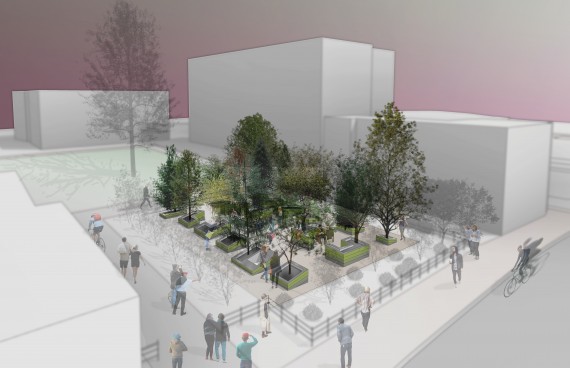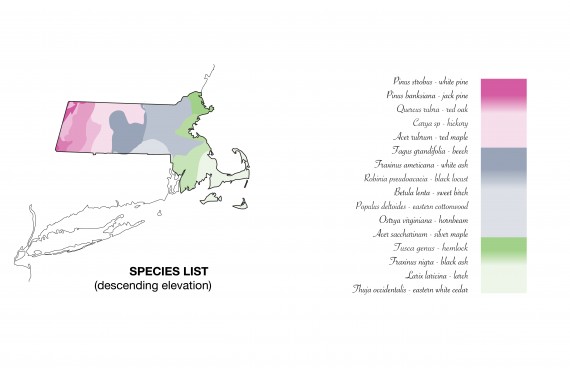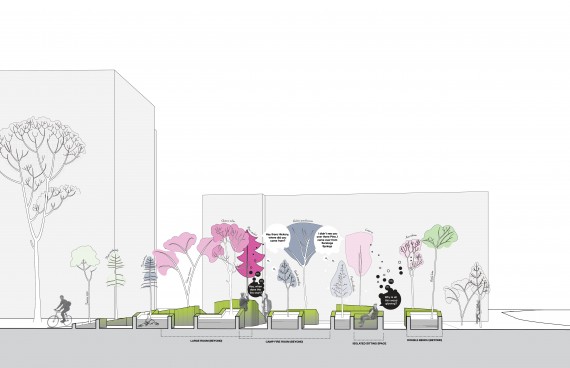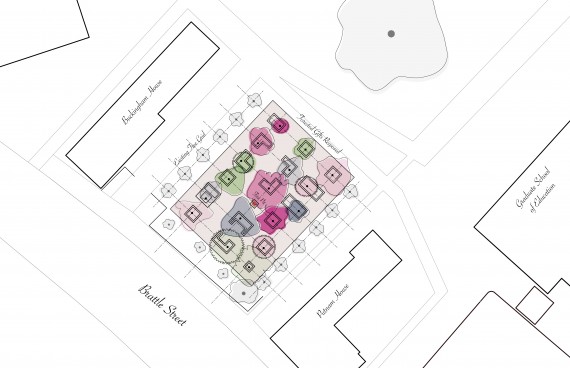Forested Gifts, Radcliffe Institute Public Art Competition w/ Oliver Curtis
Massachusetts has many natural gifts; varying microclimates and ecoregions that support and entertain all of us who call it home. To the vast community of scholars centered in Cambridge, specifically Radcliffe Fellows whose tenure is intense yet brief, there is little opportunity to engage and reflect on these gifts. Forested Gifts is an installation that not only shares these environmental systems with our community but also provides a venue for visiting fellows to eat, drink and exchange ideas.
The design’s site response is directly tied to the trees edging the courtyard flushing out this parameter condition and converting the open plaza into a dense bosque of diverse sapling trees. Inside this bosque, elevated planters transform the excavation restrictions into an opportunity that showcase the elevation changes and microclimates across the state. the trees within form a sectional gradient of ecologies across the state represent. Each planter hosts a tree and selective plantings that thrive in its analogous ecology. highest planter hosts a Pinus strobus (white pine) ecology and the lowest planter hosts a Fraxinus nigra (black ash) ecology. At the center,we removed a single tree to produce a void so that residents can enjoy evening campfires. The conversion of wood into fuel, and from fuel into heat, is an ancient gesture underscoring our reciprocal relationship with our forests.
Fire, in this particular instance, becomes architecture; a temporal extension of the spatial delineations established by the planters achieving an elevated level of environmental control through the radiative heat emitted through the flames. When there is no fire, which is more often than not, the configuration of planters provides a series of landscaped rooms within the plaza. There are spaces for different sized groups and individual benches for singular reflection. The planters are clad in, and the benches made of, Robinia pseudoacacia (black locust). This wood is well known for its rot resistance. What largely remains unknown about this particular species is that it fluoresces under ultraviolet lights, which we have selectively concealed throughout the plaza to transform it a night. As the installation changes with the seasons and the deciduous trees drop their leaves the remaining coniferous trees will continue to make the space inviting. and as the weather turns cooler the role of fire in shaping the character of the space will become increasingly important. When the installation is uninstalled, we propose the trees be gifted to the community and that the locust wood be commissioned into outdoor furniture for the campus. In this way, the ecological gifts of Massachusetts will be re-gifted to the larger community. In the end the project establishes a protocol for gift giving that will endure...



